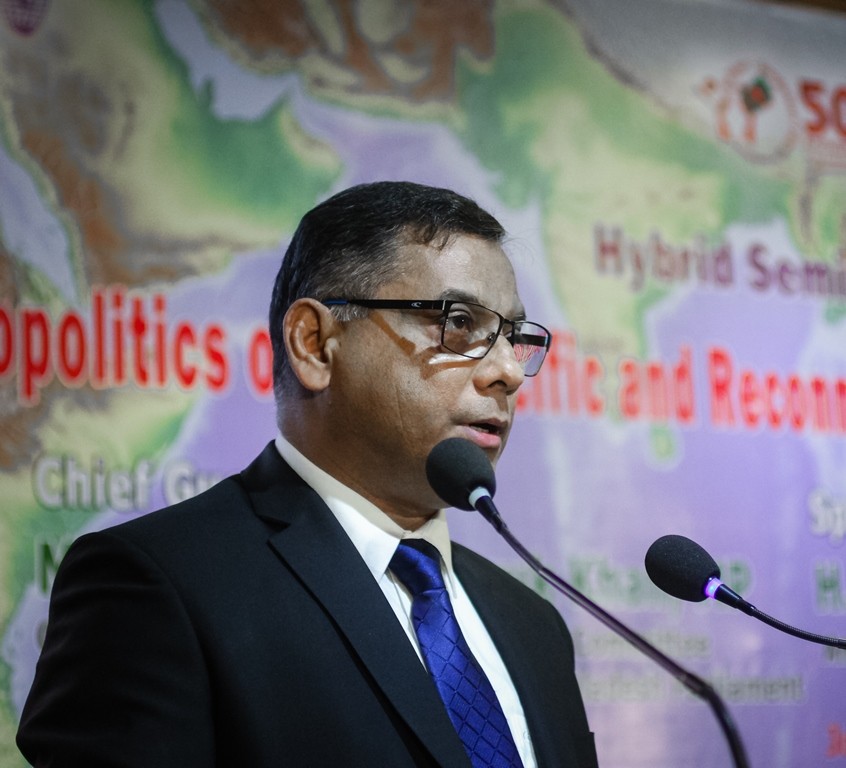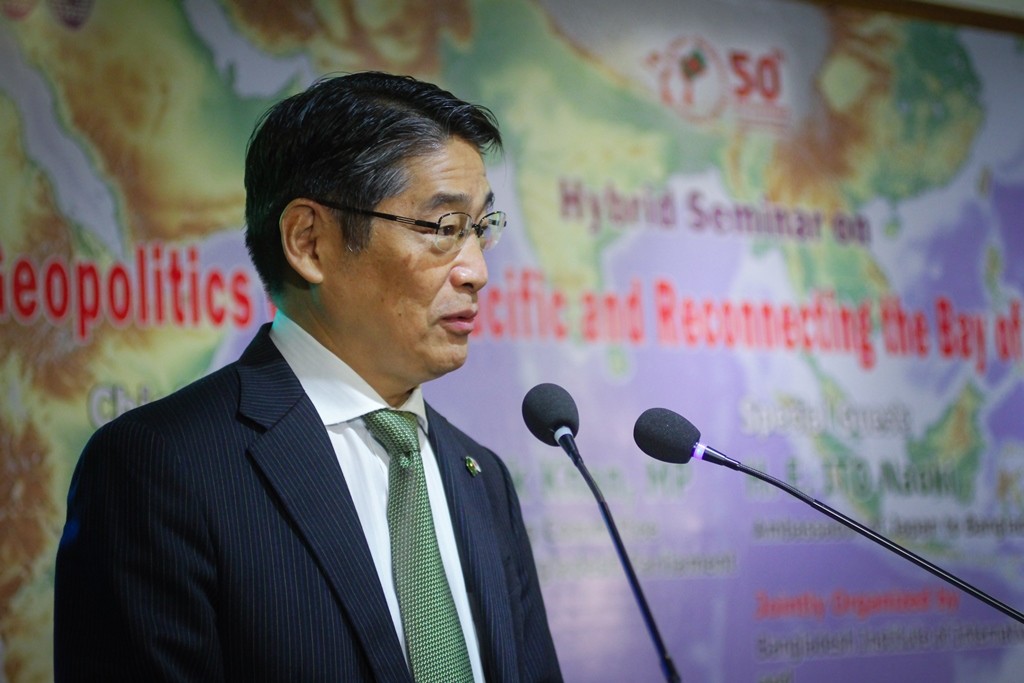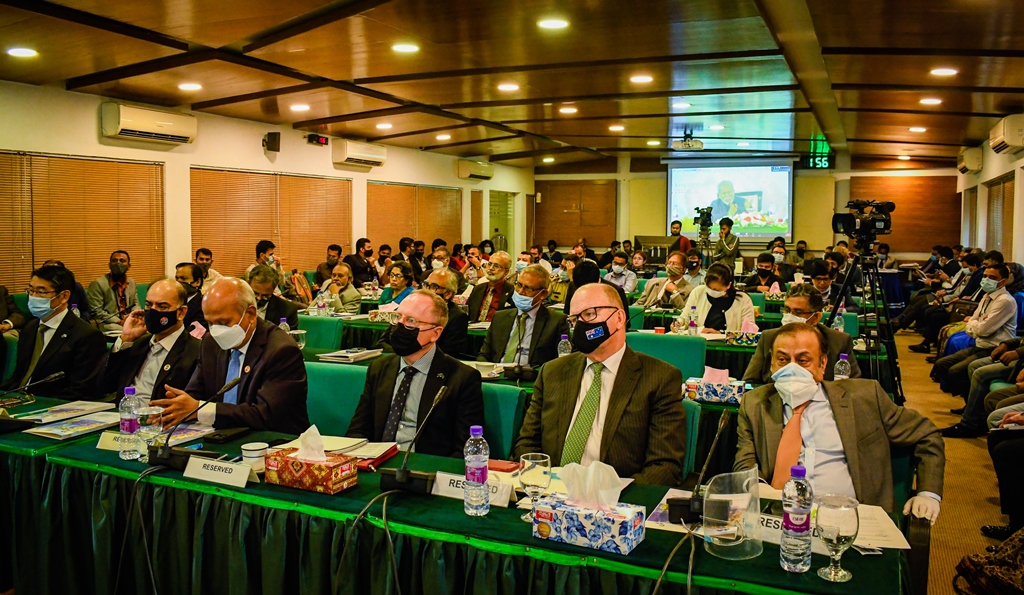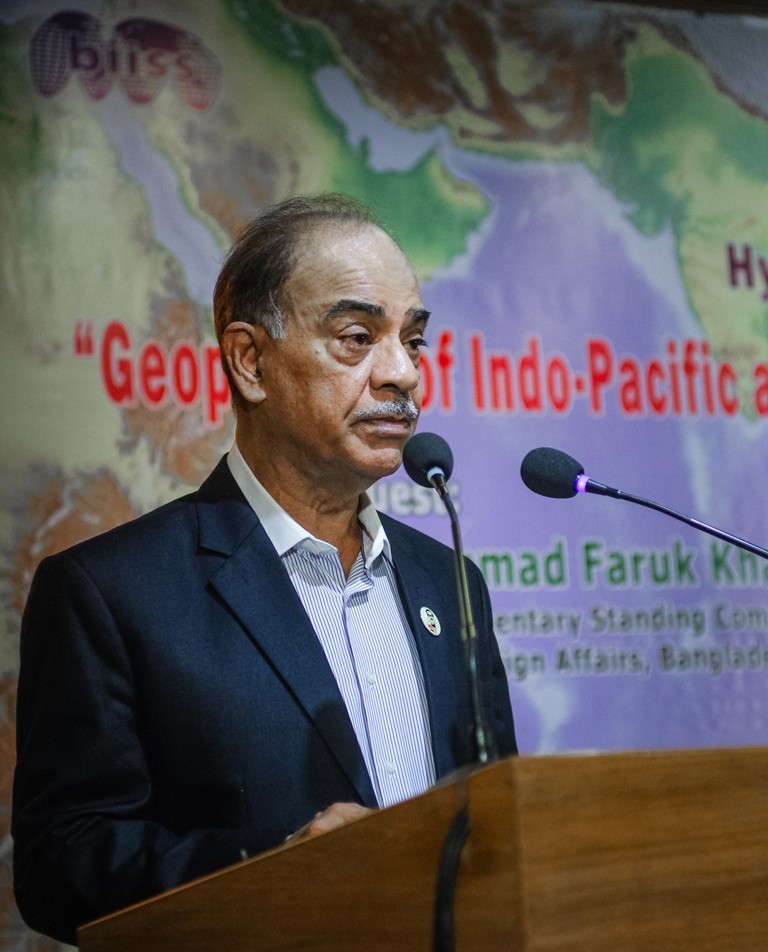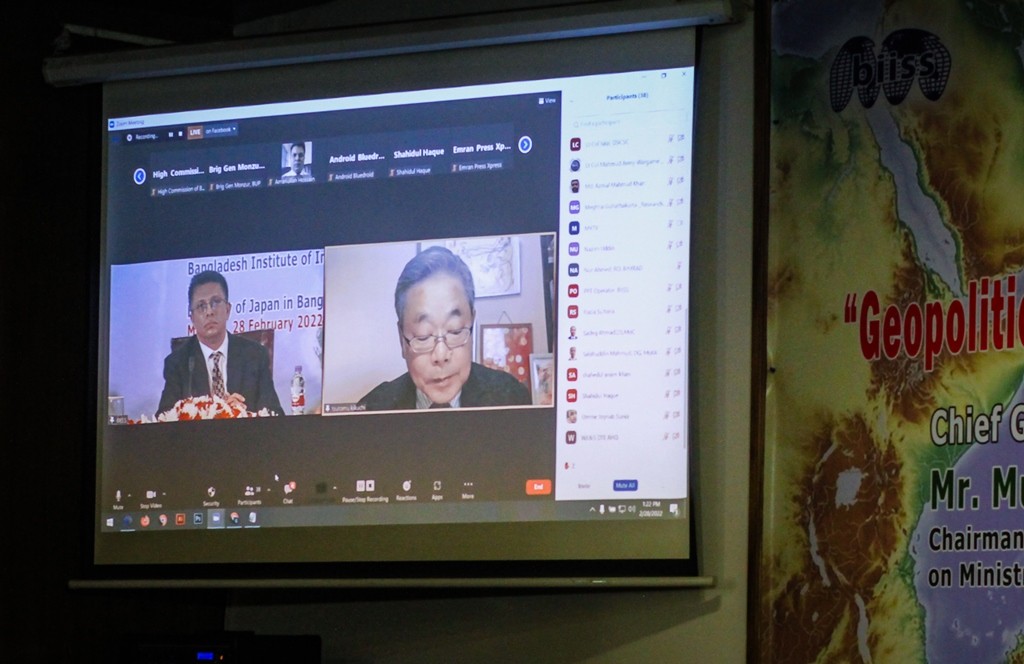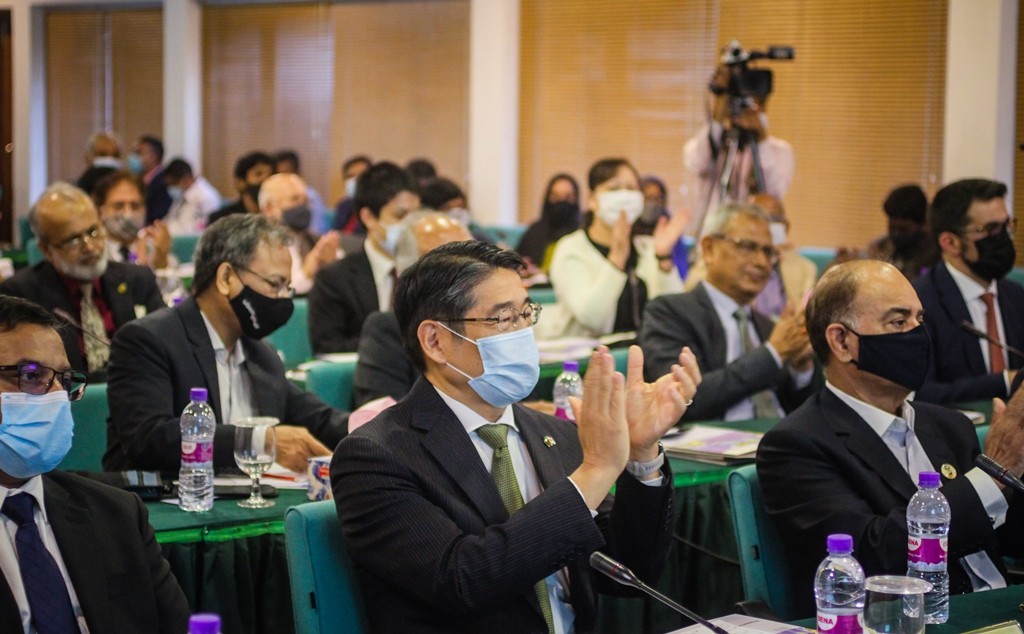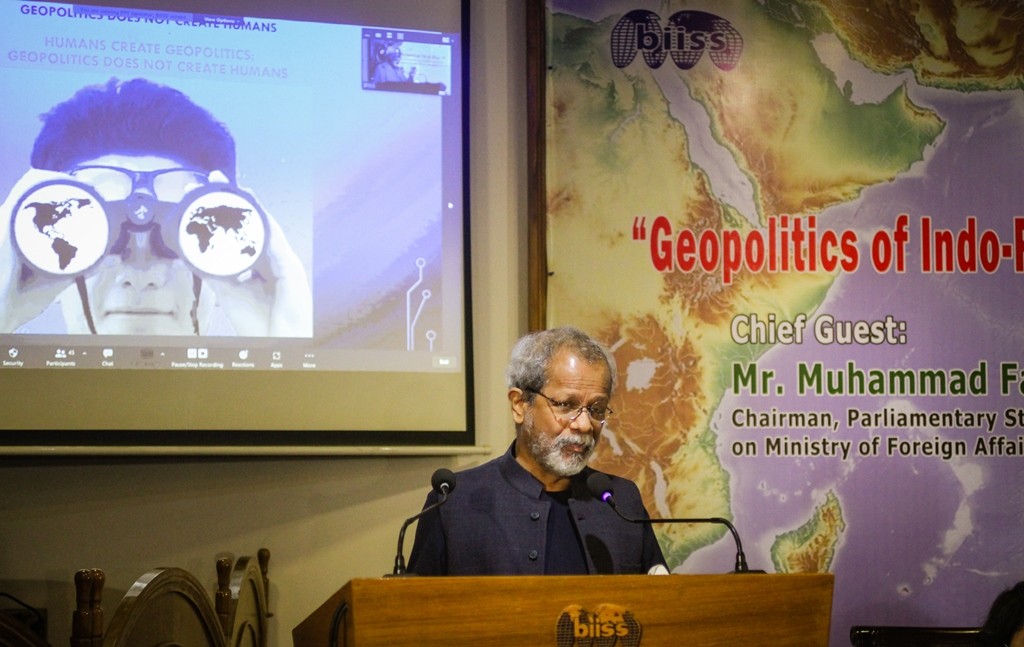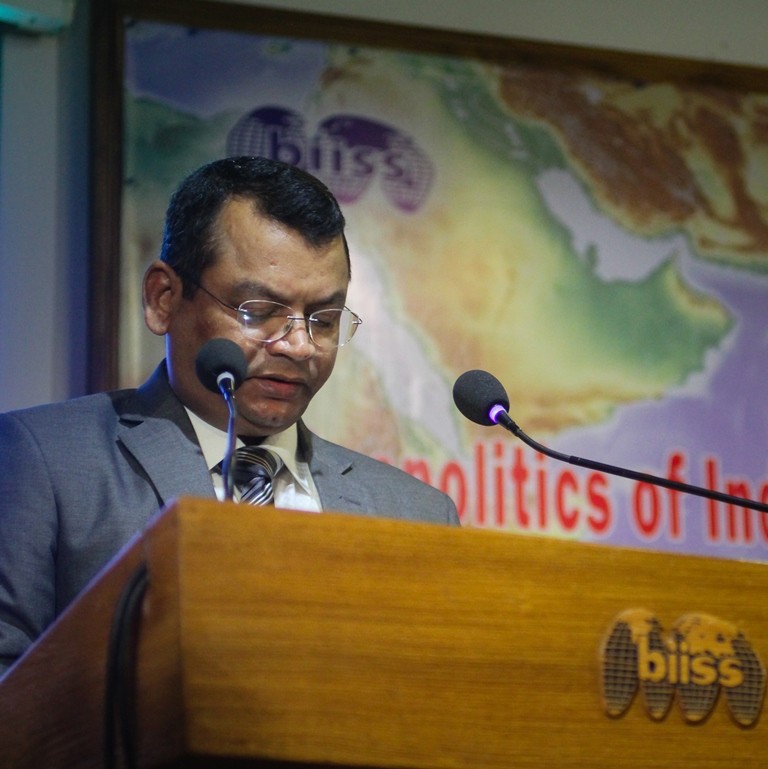Hybrid Seminar on “Geopolitics of Indo-Pacific and Reconnecting the Bay of Bengal Littorals” on 28 February 2022
DATE: 2022-02-28
Bangladesh Institute of International and Strategic Studies (BIISS) and the Embassy of Japan in Bangladesh have jointly organized a Hybrid Seminar on “Geopolitics of Indo-Pacific and Reconnecting the Bay of Bengal Littorals” on 28 February 2022. Mr. Muhammad Faruk Khan, MP, Hon’ble Chairman, Parliamentary Standing Committee on Ministry of Foreign Affairs, Bangladesh Parliament, graced the occasion as the chief guest. H.E. Mr ITO Naoki, Ambassador of Japan to Bangladesh, graced the occasion as the special guest. Major General Mohammad Maksudur Rahman, OSP, BSP, psc, Director General, BIISS, delivered the welcome address. Ambassador Kazi Imtiaz Hossain, paa, Chairman, BIISS presided over the inaugural session and delivered the concluding remarks. In the working session, Professor Imtiaz Ahmed, Department of International Relations, University of Dhaka, presented on “The Changing Nature of Geopolitics: Making Sense of Bangladesh’s Position”; Professor KIKUCHI Tsutomu, Professor of International Political Economy, Aoyama Gakuin University, Japan, made a presentation on “Beyond US-China Relations: Japan’s Strategic Vision for the Indo-Pacific”, Professor Lailufar Yasmin, Department of International Relations, University of Dhaka deliberated on “The Rise of the Indo-Pacific: Bangladesh-Japan Relations”, and Professor TAKAHARA Akio, Professor of Graduate School of Public Policy, The University of Tokyo, presented on “FOIP and Maritime Cooperation: Japan’s Initiative”. The working session was moderated by Professor Rashed Uz Zaman, Department of International Relations, University of Dhaka.
At the outset, Major General Mohammad Maksudur Rahman, OSP, BSP, psc, the Director General of BIISS described the importance of Indo-pacific region as the central determinant of global peace and prosperity in the near future as well as the hub of 21st century’s economic opportunities. He also referred to Bangladesh as the gateway to South and Southeast Asia. He highlighted that Bangladesh is geographically central in the Bay of Bengal which allows it to play a pivotal role in regional and interregional trade and commercial activities.
In his remarks, H.E. Mr ITO Naoki, Ambassador of Japan to Bangladesh noted that Bangladesh is a vital country in geopolitical terms and it needs to utilize its geographical advantage to increase economic opportunities fully. In this regard, he highlighted on several large-scale infrastructure projects from Japanese investment including Bangladesh’s first deep sea port in Matarbari, Dhaka Mass Rapid Transit (MRT) Line 6, and Bangladesh Special Economic Zone in Araihazar. He informed the audience that Japan pursues a Free and Open Indo- Pacific (FOIP) that will ensure a rule-based international order to bring peace, stability, and prosperity for every country in the region. He also highly praised Bangladesh’s efforts for sheltering the displaced Rohingyas of Myanmar and added that we should all work towards the enabling environment for the Rohingyas early repatriation to Myanmar.
In the seminar, Hon’ble Chief Guest H.E. Mr. Muhammad Faruk Khan, MP, expressed his expectation that countries such as Japan can play a more active role in ensuring peace and stability in this region as Japan is a forerunner of the concept of FOIP. He strongly believed that Bangladesh and other littorals of the Bay of Bengal want to cooperate than to antagonize each other. Besides, he mentioned about the forcibly displaced Rohingyas that may increase security threats in the Indo-Pacific region. He added that to resolve the Rohingya Crisis, our Prime Minister Sheikh Hasina also sought support from Japan’s current Prime Minister Fumio Kishida for the peaceful repatriation of Rohingyas to their homeland.
Ambassador Kazi Imtiaz Hossain, Chairman of BIISS noted that, the discussion in the Seminar is leading the way for further insights into the geopolitical shifts in the region. He reiterated that Bangabandhu’s diplomacy of “Friendship to all, Malice to none” has been the motto of Bangladesh foreign policy. And with regard to the fifty years of Bangladesh-Japan relations, he wished strongest ties between the two countries to achieve greater prosperity and economic cooperation.
Professor Imtiaz Ahmed pointed out that Bangladesh has done tremendously well in terms of both economic and human developments after the independence. He also talked about Bangladesh’s position in the geopolitical race in Indo- Pacific and praised Bangladesh’s vision of development without enmity.
Professor KIKUCHI Tsutomu said that Japan had been pursuing three pillars to establish rule-based order in this region: strengthening the alliance with the US; moving Southward to construct networks with new alignments (bilateral, trilateral, quadrilateral, and regional) with the countries and institutions in the Indo-Pacific; and constructive engagement with China. He also expressed that Bangladesh, which is located on the strategic trade route of the Indo-Pacific, is a very important country for the realization of Japan’s Indo-Pacific vision.
Professor Lailufar Yasmin noted that Japan is one of the countries which extended cooperation to Bangladesh in its early days of Independence which helped the country to survive amidst different odds. She added that Bangladesh’s economy is growing successfully with an awe. She referred to the bilateral relationship between Bangladesh and Japan as a “Friendship matured with time” and suggested for more people-to-people contacts.
Professor TAKAHARA Akio highlighted that there are three pillars to uphold FOIP- commitment for peace and stability, promotion and establishment of the rule of law, freedom of navigation, free trade, and Pursuit of economic prosperity. He also mentioned that JICA is cooperating in maritime safety and security through different training programs, grant aid, and ODA loans etc. He also argued that FOIP and BRI can coexist in economic aspects rather than in strategic aspects and Bangladesh could help implement projects in areas where FOIP and BRI can be connected.
The moderator of the session Professor Rashed Uz Zaman said that there are geopolitical uncertainties in the Indo-Pacific that need to be addressed, and all the littorals should focus on the possibilities and opportunities of a connected Indo-Pacific region.
Senior officials from different ministries of government, ambassadors and high commissioners, former diplomats, senior military officials, media, academia, researchers, teachers and students from different universities, representatives from different international organizations, participated in the Seminar and presented their valuable opinions in the open discussion session.

